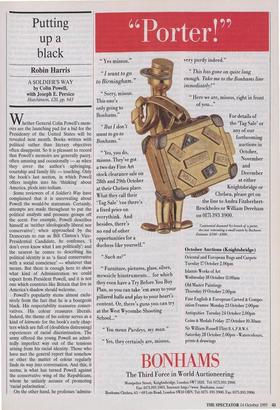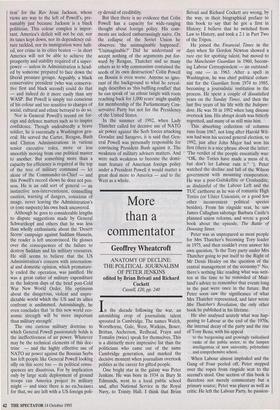Putting up a black
Robin Harris
A SOLDIER'S WAY by Colin Powell, with Joseph E. Persico Hutchinson, f20, pp. 643 Whether General Colin Powell's mem- oirs are the launching pad for a bid for the Presidency of the United States will be revealed next month. Books written with political rather than literary objectives often disappoint. So it is pleasant to record that Powell's memoirs are generally pacey, often amusing and occasionally — as when they cover the author's upbringing, courtship and family life — touching. Only the book's last section, in which Powell offers insights into his 'thinking' about America, plods into tedium.
Some reviewers of A Soldier's Way have complained that it is unrevealing about Powell the would-be statesman. Certainly, attempts are made throughout to put the political analysts and pressure groups off the scent. For example, Powell describes himself as 'neither ideologically liberal nor conservative'; when approached by the Democrats to run as Bill Clinton's Vice- Presidential Candidate, he confesses, 'I don't even know what I am politically'; and the nearest he comes to describing his political identity is as 'a fiscal conservative with a social conscience' — whatever that means. But there is enough here to show what kind of Administration we could expect from President Powell, and it is not one which countries like Britain that live in America's shadow should welcome.
Powell's popularity stems almost exclu- sively from the fact that he is a bourgeois black. His respectability reassures conser- vatives. His colour reassures liberals. Indeed, the theme of his colour serves as a kind of leitmotiv for the book's early chap- ters which are full of (doubtless distressing) experiences of racial discrimination. The army offered the young Powell an admit- tedly imperfect way out of the tensions arising from his racial identity. Those who have met the general report that somehow or other the matter of colour regularly finds its way into conversation. And this, it seems, is what has turned Powell against the conservative wing of the Republicans, whom he unfairly accuses of promoting `racial polarisation'.
On the other hand, he professes `atimira- tion' for the Rev Jesse Jackson, whose views are way to the left of Powell's, pre- sumably just because Jackson is a black politician. This colour complex is impor- tant. America's deficit will not be cut, nor its taxes kept down, nor its dependency cul- ture tackled, nor its immigration wave halt- ed, nor crime in its cities beaten — in short America will not be able to achieve the prosperity and stability required of a super- power — unless its Administration is head- ed by someone prepared to face down the liberal pressure groups. Arguably, a black conservative president (who was conserva- tive first and black second) could do that — and indeed do it more easily than any WASP. But Powell is simply too conscious of his colour and too sensitive to charges of social, cultural and ethnic betrayal to do so.
Nor is General Powell's record on for- eign and defence matters such as to inspire confidence. Though undoubtedly a brave soldier, he is essentially a Washington gen- eral. He served the Carter, Reagan, Bush and Clinton Administrations in various senior executive roles, more or less smoothly moving from one political master to another. But something more than a capacity for efficiency is required at the top of the tree of military command — let alone of the Commander-in-Chief — and this Powell's record shows he does not pos- sess. He is an odd sort of general — an instinctive non-interventionist, counselling caution, warning of dangers, conscious of image, never leaving the Administration's or (one suspects) his own back uncovered.
Although he goes to considerable lengths to dispute suggestions made by General Schwarzkopf and others that he was less than wholly enthusiastic about the 'Desert Storm' campaign against Saddam Hussein, the reader is left unconvinced. He glosses over the consequences of the failure to destroy Saddam and his military resources. He still seems to believe that the US Administration's concern with internation- al and domestic opinion, which premature- ly ended the operation, was justified. He was a great cutter of military expenditure in the halcyon days of the brief post-Cold War New World Order. His optimism about the dangerous, violent and unpre- dictable world which the US and its allies confront is undimmed. Astonishingly, he even concludes that 'in this new world eco- nomic strength will be more important than military strength'.
The one curious military doctrine to which General Powell passionately holds is the ineffectiveness of air power. Whatever may be the technical elements of this doc- trine — and the highly effective use of NATO air power against the Bosnian Serbs has left people like General Powell looking silly on this score too — its political conse- quences are disastrous. For by implication only by large scale deployment of ground troops can America project its military might — and since there is no en,..husiasra for that, we are left with a US foreign poli- cy devoid of credibility.
But then there is no evidence that Colin Powell has a capacity for wide-ranging thought about foreign policy. His com- ments are indeed embarrassingly naive. On the collapse of the Soviet Union he observes: 'the unimaginable happened'. `Unimaginable?' Did he understand or accept nothing of the arguments put for- ward by Reagan, Thatcher and so many others as to why communism contained the seeds of its own destruction? Colin Powell on Bosnia is even worse. Anyone so igno- rant of the background to what he reveal- ingly describes as 'this baffling conflict' that he can speak of 'an ethnic tangle with roots reaching back for 1,000 years' might qualify for membership of the Parliamentary Con- servative Party but not for the Presidency of the United States.
In the summer of 1992, when Lady Thatcher called for decisive use of NATO air power against the Serb forces attacking Goradze and Sarajevo, it is said that Gen- eral Powell was personally responsible for convincing President Bush against it. The weakness of military advisers matters. And were such weakness to become the domi- nant feature of American foreign policy under a President Powell it would matter a great deal more to America — and to the West as a whole.











































































 Previous page
Previous page